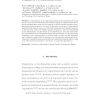Free Online Productivity Tools
i2Speak
i2Symbol
i2OCR
iTex2Img
iWeb2Print
iWeb2Shot
i2Type
iPdf2Split
iPdf2Merge
i2Bopomofo
i2Arabic
i2Style
i2Image
i2PDF
iLatex2Rtf
Sci2ools
117
click to vote
IJPP
2007
2007
A Compositional Framework for Developing Parallel Programs on Two-Dimensional Arrays
Computations on two-dimensional arrays such as matrices and images are one of the most fundamental and ubiquitous things in computational science and its vast application areas, but development of efficient parallel programs on twodimensional arrays is known to be hard. In this paper, we propose a compositional framework that supports users, even with little knowledge about parallel machines, to develop both correct and efficient parallel programs on dense two-dimensional arrays systematically. The key feature of our framework is a novel use of the abidetree representation of two-dimensional arrays. The presentation not only inherits the advantages of tree representations of matrices where recursive blocked algorithms can be defined to achieve better performance, but also supports transformational development of parallel programs and architecture-independent implementation owing to its solid theoretical foundation - the theory of constructive algorithmics.
Related Content
| Added | 15 Dec 2010 |
| Updated | 15 Dec 2010 |
| Type | Journal |
| Year | 2007 |
| Where | IJPP |
| Authors | Kento Emoto, Zhenjiang Hu, Kazuhiko Kakehi, Masato Takeichi |
Comments (0)

